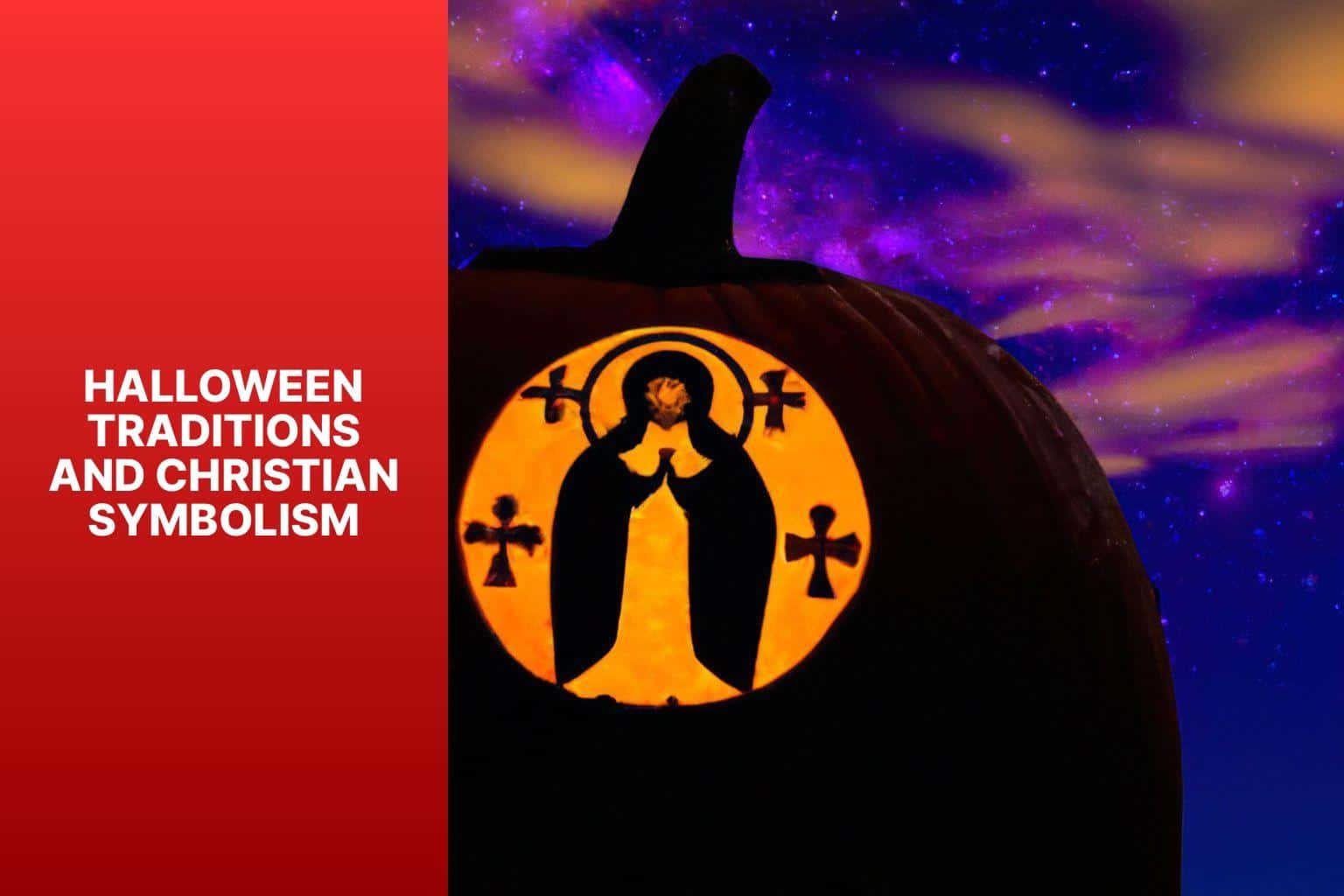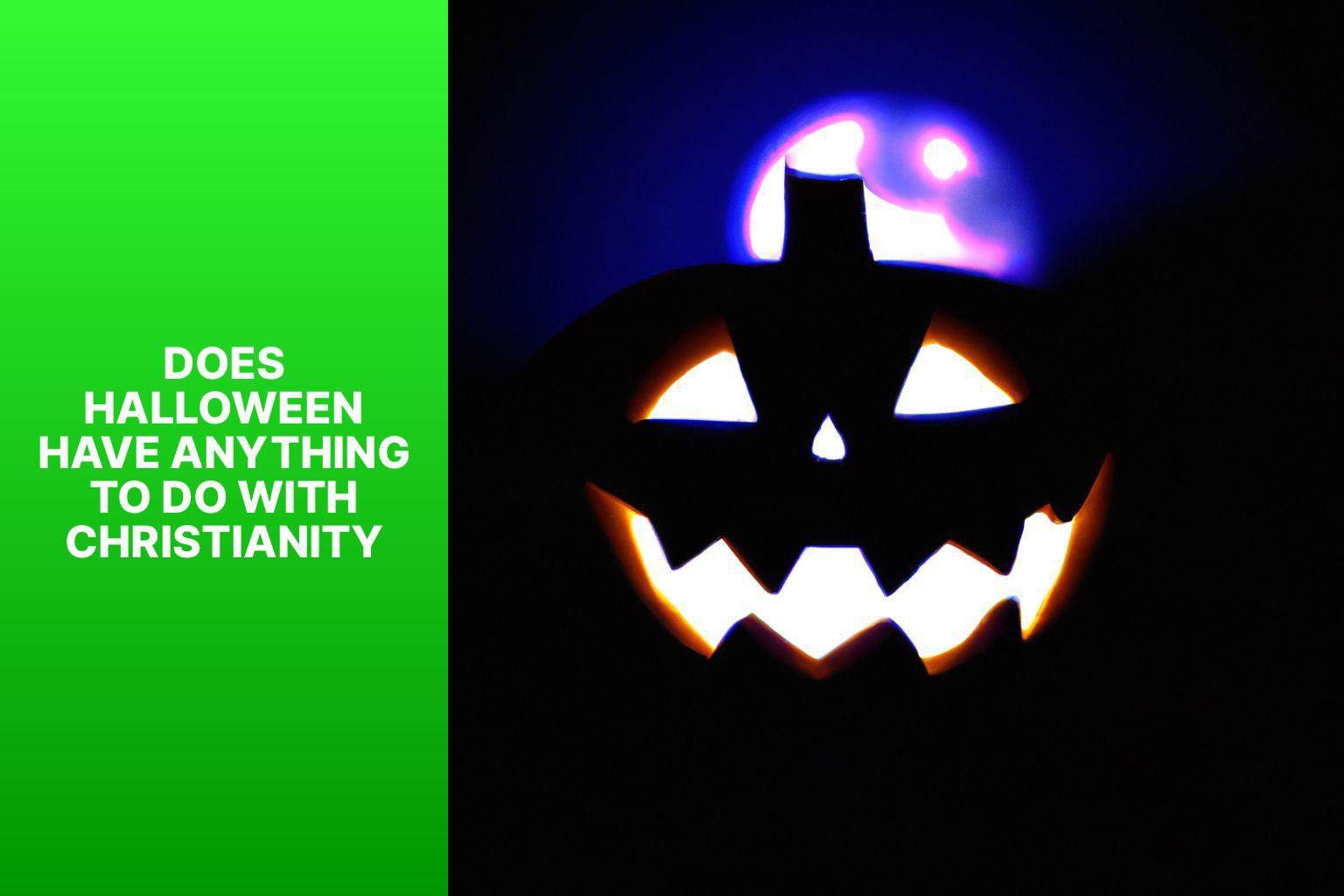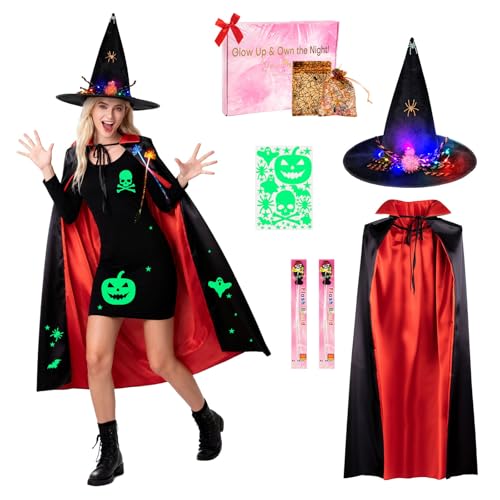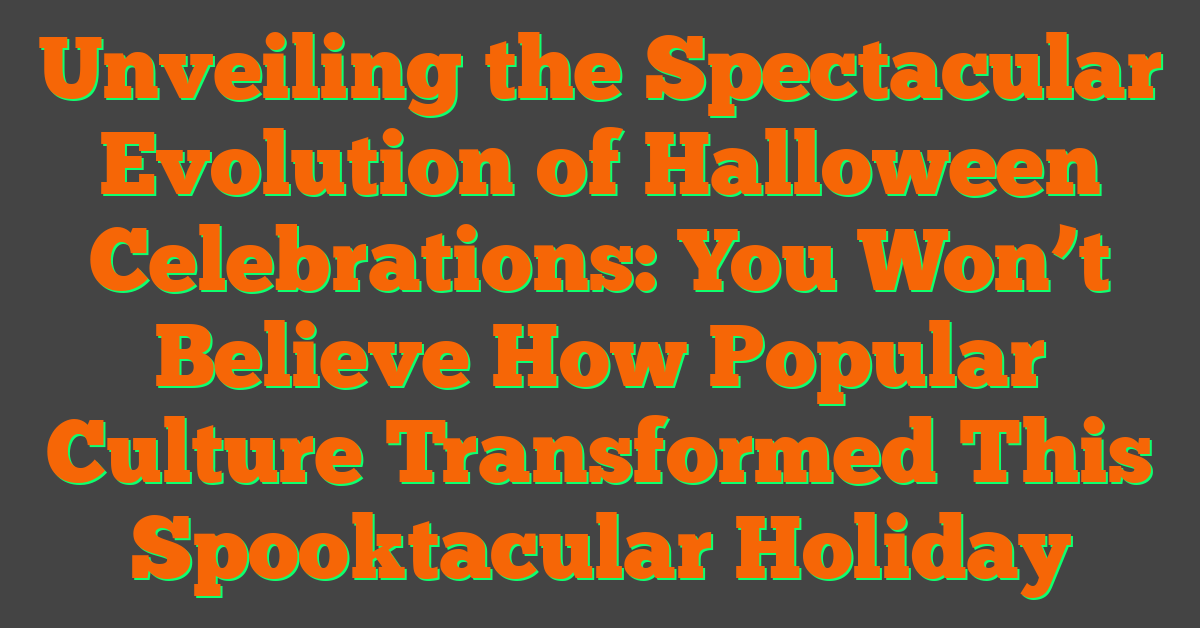Halloween, with its spooky traditions and festivities, has long been associated with the supernatural and the macabre. But does it have any connection to Christianity? Exploring the historical origins and influences, we can uncover the relationship between Halloween and Christianity.
The origins of Halloween can be traced back to ancient Celtic festival of Samhain, which marked the end of the harvest season and the beginning of the dark, cold winter. It was believed that on this night, the boundary between the living and the dead was blurred, and spirits could roam the Earth. The influence of Roman festivals, such as the Feralia and Pomona, also contributed to the traditions and practices associated with Halloween.
Interestingly, Christianity has had its influence on Halloween as well. All Saints’ Day, also known as All Hallows’ Day, is a Christian holiday celebrated on November 1st, dedicated to honoring all known and unknown saints. The evening before, October 31st, became known as All Hallows’ Eve, which eventually evolved into Halloween. All Souls’ Day, commemorating the souls of the departed, is observed on November 2nd.
Halloween traditions, while often associated with pagan and secular practices, also have Christian symbolism intertwined. The tradition of Jack-o’-lanterns, for example, is said to have originated from the tale of Stingy Jack, a character in Irish folklore who made a deal with the devil. Trick-or-treating, where children go door-to-door collecting treats, is believed to have originated from the Christian practice of souling, where the poor would go from house to house asking for soul cakes in exchange for prayers for the dead. Costume parties can be seen as a playful way to embrace characters from Christian history or folklore.
The connection between Halloween and Christianity is a topic of controversy and differing perspectives. Some Christians view Halloween as conflicting with their beliefs due to its association with pagan practices and the occult. Others see it as an opportunity to reclaim the holiday and emphasize its Christian significance. Cultural adaptation and secularization have also shaped the modern celebration of Halloween, where traditions vary across different regions and communities.
Key takeaway:
- Halloween has roots in both Celtic and Roman festivals: The origins of Halloween can be traced back to the Celtic festival of Samhain and the influence of Roman festivals.
- Christianity has influenced Halloween: All Saints’ Day, All Hallows’ Eve, and All Souls’ Day are Christian observances that have become connected to Halloween.
- Halloween traditions and Christian symbolism: Jack-o’-lanterns, trick-or-treating, and costume parties have developed as Halloween traditions with both cultural and Christian influences.
Origins of Halloween
Unveiling the mysterious origins of Halloween, we embark on a journey through time to explore its ancient roots. From the ancient Celtic Festival of Samhain to the intriguing influence of Roman festivals, this section unwraps the fascinating historical tapestry behind one of the most beloved holidays. So, buckle up and prepare to discover the captivating beginnings of Halloween that intertwine cultures, traditions, and the ever-evolving spirit of celebration.
Celtic Festival of Samhain
The Celtic Festival of Samhain marks the end of the harvest season and the start of winter. It originated in the Celtic territories of Ireland, Scotland, and Wales. During this festival, the Celts believed that the boundary between the living and the dead was blurred, allowing spirits to wander freely. They lit bonfires and wore costumes to protect themselves from these wandering spirits. It was also a time to thank the gods for the abundant harvest and seek their protection for the cold winter months.
The Celtic Festival of Samhain played a crucial role in the development of Halloween. Many Halloween traditions, such as wearing costumes and carving pumpkins, have their origins in this ancient Celtic celebration. As Christianity spread in the Celtic regions, the festival merged with Christian traditions, giving rise to modern-day Halloween celebrations.
To learn more about the origins of Halloween and the Celtic Festival of Samhain, explore historical sources and cultural studies. Ancient Celtic folklore and customs provide valuable insights into the rich history and symbolism behind this festive occasion.
Understanding the roots of Halloween and its connection to the Celtic Festival of Samhain enhances our appreciation for this holiday and its cultural importance. So, the next time you dress up or carve a pumpkin, remember the ancient traditions that have shaped this beloved celebration.
Influence of Roman Festivals
The influence of Roman festivals is evident in the development of Halloween traditions. The Romans had festivals that greatly influenced the customs and rituals associated with Halloween. These festivals, such as Feralia, Pomona, and Lemuria, played a significant role in shaping the traditions we continue to celebrate today.
For example, Feralia, which was celebrated in late October, honored the dead with offerings and rituals at gravesites. This festival has influenced the belief in spirits roaming on Halloween night.
Pomona, a festival dedicated to the Roman goddess of fruit and trees, was celebrated in early November and involved apple bobbing. This Halloween game can be traced back to this Roman festival.
Similarly, the festival of Lemuria appeased restless spirits of the dead with purification rituals and offerings. This concept of appeasing the spirits has influenced the customs associated with Halloween.
All of these Roman festivals have laid the foundation for the Christian celebration of All Hallows’ Eve, which eventually became Halloween. Understanding this historical influence adds depth to our Halloween traditions.
Christian Influences on Halloween
Get ready to discover the fascinating Christian influences on Halloween. We’ll dive into the intriguing sub-sections of All Saints’ Day, All Hallows’ Eve, and All Souls’ Day. Unravel the connections and traditions rooted in Christianity that have added depth and meaning to this widely celebrated holiday. So, let’s explore how these significant events have influenced Halloween and its customs in surprising ways.
All Saints’ Day
is a Christian holiday observed on November 1st each year. It honors and remembers all the saints, both known and unknown. The holiday originated in the early Christian church to commemorate martyrs who died for their faith. Over time, it expanded to include all saints, recognizing the importance of honoring those who lived exemplary lives of faith.
On All Saints’ Day, Christians attend special church services and may light candles or offer prayers for the saints. It is a day to reflect on the lives of these holy men and women and seek their intercession and inspiration in our own lives.
All Saints’ Day is particularly significant for Catholics, who believe in the communion of saints. They believe that saints in heaven can intercede on behalf of the living and offer them spiritual assistance and guidance. Catholics may also visit cemeteries on this day to pay respects to their deceased loved ones.
Suggestions: Take time to learn about the lives and stories of various saints. Consider praying for their intercession in your spiritual journey. Visit a local church or attend a service to experience the rich traditions associated with All Saints’ Day.
All Hallows’ Eve
“On All Hallows’ Eve, people partake in various traditions and activities. These include dressing up in costumes and attending costume parties, carving jack-o’-lanterns, decorating homes and yards with spooky decorations, going to haunted attractions and haunted houses, playing Halloween-themed games and watching scary movies, and trick-or-treating, where children go door to door asking for candy.
To make the most of All Hallows’ Eve, plan your costume ahead of time and let your imagination run wild. You can also incorporate Christian symbolism into your decorations or activities, such as displaying crosses or praying for the souls of the departed.
Enjoy your All Hallows’ Eve celebrations while staying safe!”
All Souls’ Day
All Souls’ Day, also known as the Feast of All Souls, is a Christian holiday on November 2nd. It is a day to pray for the souls of the departed, especially those in purgatory.
On All Souls’ Day, Christians remember and honor their loved ones who have died. They visit cemeteries to pray for the souls of the deceased and often light candles or place flowers on their graves as a sign of respect.
Purgatory, a temporary state of purification after death, is a key belief of All Souls’ Day. Prayers and acts of devotion on this day help the souls in purgatory get closer to entering heaven.
Many Christian denominations observe All Souls’ Day in different ways, including the Roman Catholic Church, the Eastern Orthodox Church, and some Protestant churches. The focus is on remembering and praying for the souls of the departed.
Halloween Traditions and Christian Symbolism

Photo Credits: Rickyshalloween.Com by Jordan Johnson
Discover the enchanting world where Halloween traditions intertwine with Christian symbolism. From the flickering glow of Jack-o’-Lanterns to the thrill of Trick-or-Treating and the whimsy of Costume Parties, this section is your gateway to unraveling the captivating connections between Halloween and its deep-rooted ties to Christian beliefs. Get ready to explore the fascinating history, rituals, and meanings that make Halloween an intriguing blend of ancient customs and religious significance. Prepare to be amazed!
Jack-o’-Lanterns
have become a symbol of Halloween, originating from Irish folklore. Here are some facts about
True story: A group of friends had a pumpkin carving contest. Their stunning Jack-o’-Lanterns with flickering candlelight attracted passersby who took pictures. The friends felt proud and enjoyed a memorable Halloween night of laughter, friendly competition, and sharing their artistic talent with the community.
Trick-or-Treating
Trick-or-treating is a beloved Halloween tradition that originated from the custom of “souling” in medieval England.
Children, dressed up in costumes, go door-to-door to collect candy, carrying a bag or bucket to hold their sweet treats.
When they arrive at a door, they enthusiastically say “trick or treat” in hopes of receiving an assortment of candies like chocolate bars, lollipops, and gummy candies.
Neighbors who participate in trick-or-treating will have their lights on and may even decorate their homes to create a festive atmosphere.
It’s fascinating to think that this fun-filled activity, enjoyed by kids everywhere, can be traced back to the humble beginnings of poor people going door-to-door on Hallowmas to receive food in exchange for reciting prayers for the deceased.
Costume Parties
Costume parties are a popular tradition during Halloween.
People enthusiastically dress up in a wide variety of costumes, ranging from spooky creatures to famous characters.
These parties feature themed decorations and music, creating a lively and festive atmosphere.
A highlight of costume parties is the costume contest, where attendees can showcase their creativity and have the chance to win prizes.
Guests socialize, dance, and take memorable photos with each other in their amazing costumes.
I had the opportunity to attend a spectacular Halloween costume party with my friends. The venue was utterly transformed into a hauntingly mystical haunted house, complete with chilling decorations and just the right amount of atmospheric dim lighting. Each and every attendee truly went above and beyond with their costumes, and I was absolutely astounded by the incredible level of detail and effort put into crafting each outfit. From wicked witches and ghastly vampires to awe-inspiring superheroes, the range of costumed characters was simply mesmerizing. A group of friends impressively coordinated their costumes, channeling beloved characters from a popular TV show. Throughout the night, we danced, laughed, and had an incredible time. The absolute highlight of the entire event had to be the highly-anticipated costume contest. The energy in the room was palpable as attendees eagerly cheered on their favorite costumes and cast their votes. It was an unforgettable evening filled with laughter, boundless creativity, and a true sense of community. Undoubtedly, costume parties truly enhance the fun and excitement of Halloween.
Controversies and Perspectives
Controversies and Perspectives – Explore the intriguing world of the connection between Halloween and Christianity through the lens of Christian debates and cultural adaptation. Uncover differing viewpoints and the rich tapestry of historical and religious influences. Can this seemingly secular holiday find common ground with Christianity? Delve into the complexities and find out how perspectives have shaped the way Halloween is celebrated today.
Christian Debates
Christian debates about Halloween revolve around its religious implications and beliefs. These discussions explore various viewpoints and perspectives among Christians regarding the holiday.
One aspect of the debate focuses on religious appropriation. Certain Christians argue that Halloween’s pagan origins conflict with their religious beliefs, leading them to believe that it should not be celebrated. They express concerns about participating in activities that are not consistent with their faith.
Another point of contention within Christian debates on Halloween is the perceived satanic connotations associated with the holiday. Some Christians believe that Halloween promotes evil, witchcraft, and Satanism, and they advocate for Christians to refrain from engaging in related activities.
Not all Christians view Halloween in a negative light. Some see it as an opportunity for Christian redemption and a chance to bring light to the darkness. These individuals believe that participating in Halloween activities allows them to connect with their communities and share their faith in a meaningful way.
Certain Christian denominations highlight the importance of All Saints’ Day on November 1st and consider Halloween as a preparation for this significant observance. They emphasize the celebration of saints and the remembrance of those who have passed away.
The debate surrounding Halloween within Christianity is subjective and varies depending on personal beliefs and interpretations of scripture. While some Christians choose to participate in Halloween festivities, others prefer to avoid them altogether. Ultimately, each individual makes their own decision based on their faith and values.
Cultural Adaptation
Cultural adaptation plays a vital role in the evolution of Halloween traditions. Halloween has a tendency to incorporate local customs and beliefs as it spreads, resulting in the emergence of unique variations of the holiday. A noteworthy example of this phenomenon is the fusion of Dia de los Muertos traditions with Halloween celebrations in Mexico and other Latin American countries. This blending of customs from different cultures enhances the richness and diversity of the holiday.
Another significant example of cultural adaptation is the adoption of Halloween by non-Christian cultures. Nowadays, Halloween has become a secular holiday celebrated by people of various faiths and backgrounds. This cultural adaptation allows Halloween to transcend religious boundaries and transform into a universal celebration of costumes, candy, and fun.
Cultural adaptation also manifests in the way Halloween is celebrated. Different regions have their own customs and practices, such as lighting bonfires or performing traditional dances. These adaptations reflect the creativity and ingenuity of communities in incorporating Halloween into their cultural fabric.
A helpful tip: Embrace the cultural diversity of Halloween by exploring how different communities celebrate the holiday. Try incorporating elements from various traditions into your own celebrations to make it an inclusive and enriching experience.
Frequently Asked Questions
Does Halloween have anything to do with Christianity?
Halloween has a complex history and its connection to Christianity remains a subject of debate among Christians. While the Bible does not directly mention Halloween, the holiday originated from ancient Celtic harvest festivals and the evening before All Hallows Day. The church incorporated some pagan practices into Christian holidays, including Halloween, to ease conversion. Christians have varying beliefs on whether Halloween can be celebrated in good conscience.
What is the meaning of Halloween?
Halloween, also known as All Hallows’ Eve, is traditionally considered a pagan holiday where the souls and spirits of the dead are believed to roam the Earth. The holiday’s practices have evolved over time, but its purpose of honoring the dead remains the same. It is a time for people to remember and pay tribute to departed loved ones.
What is the origin of Halloween?
Halloween originated from the Samhain festival, celebrated by the ancient Celts over 2,000 years ago in England, Ireland, and Northern France. Samhain was the biggest holiday of the year for the Celtic people and was associated with the belief that the souls of the dead could mingle with the living. Over time, Halloween’s practices and traditions have been influenced by various cultures and customs.
Are there any connections between Halloween and Christian holidays?
Halloween has some connections to Christian holidays. Halloween is derived from the evening before All Hallows Day, celebrated on November 1, which is a religious feast day to honor the Saints. Some Christians celebrate Reformation Day on November 1 to commemorate Martin Luther nailing his 95 theses to the church doors. The extent of these connections and their significance may vary among different Christian communities.
What are some Christian alternatives to celebrating Halloween?
For Christians who have reservations about celebrating Halloween, there are alternative celebrations. These include Trunk-or-Treat, where church members decorate their car trunks and hand out candy in a controlled environment. Fall Festivals are also popular alternatives, featuring fall-themed atmospheres and carnival-style booths. Some Christians may choose to ignore Halloween altogether by turning off their porch lights and going about their usual business.
How should Christians approach Halloween?
Approaches to Halloween among Christians can differ based on personal convictions and church teachings. Some Christians view Halloween as an opportunity to celebrate family, community, dress-up, and life in abundance. They believe it can be a positive event if separated from any occult practices. Other Christians may exercise caution and choose limited participation or avoid the holiday altogether. It is important for Christians to seek discernment, biblical principles, and the leading of the Holy Spirit when deciding how to approach Halloween.










